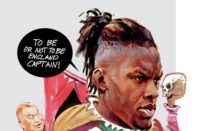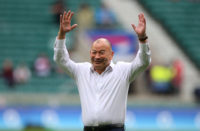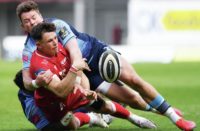NEVER underestimate George Robson, on or off the field. Of all the hardnosed, cussed, stalwart Premiership locks over the last decade he is probably the last one you would have envisaged finishing his playing days at Oxford University while studying for an Executive MBA at the prestigious Said Business School.
Until five years ago Robson had no academic pretensions whatsoever. In his late teens University had passed him by, choosing to plunge headlong into professional rugby after attending Bromsgrove School from where he won England U16 and U18 caps. He happily jumped onto the rugby treadmill and having done that it can be fiendishly difficult to get off.
Only in 2013 did Robson have a Damascus moment after being taken to the cleaners by Paul O’Connell in a game against Munster – in fairness he joins a long queue there – and decide that he needed to get something in place for life after rugby. That led to a first class BA honours degree in management and leadership at Northumbria University – more of which anon – which in turn, and by a circuitous route, led him to apply for the massively oversubscribed two- year MBA course in Oxford. Much to his surprise, he made the cut.
Did I say surprise? Perhaps not. Robson has always punched well above his weight. Not quite 6ft 5in, he seemingly lacks the physical presence of some of the second row monsters he came up against week after week with Quins and then Oyonnax in the Top 14, nor is he particularly blessed with pace and basketball handling skills.
But for ten years or so he was the undoubted hardman of that Quins pack and was desperately missed when he moved on in 2015. Regulars at the Stoop will tell you Robson has never been adequately replaced. Subsequent Quins packs continue to lack the edge he brought.
And he wasn’t just a rock solid physical presence in the Quins eight, he was the lineout technician and brains, making the calls and securing an endless stream of quality pill against much bigger and seemingly more athletic opponents. His rugby intellect was massive, and that intellect is now being directed to the business and academic world.
As well as the demanding course, he is continuing his daytime job as director of operations and business development in Europe for MusclePharm, with his accommodating sports mad CEO Ryan Drexler insisting that he should not pass up on the chance of two years at Oxford. Between them they would mould the job around his academic commitments. It would be well worth it in the long run.
And then on top of all that there is, at the age of 33, a final unexpected rugby fling as he passes on his hard earned knowledge to his young Blues pack as they work out how to try and stop a third Cambridge win on the trot next month.
There was much to discuss when we caught up this week in between a business trip to the continent and a demanding, forensic, essay assessment that had been looming for a week or two.
First, let’s retrace that journey to Oxford. To borrow from poet Robert Frost he has certainly ‘taken the road less travelled’.
“It effectively started when I realised I had probably reached my ceiling as a rugby player at Harlequins,” muses Robson, who made over 200 appearances for the club. “I can’t speak highly enough of Quins, they were my club from a schoolboy onwards, the players were always well treated and in Conor (O’Shea) during our Premiership winning season we had one of the best directors of rugby. A great boss. We all enjoyed each other’s company, playing rugby at Quins was never ever just a job and that counted for a lot.
“But I started to get a bit fretful at the end of the 2012-13 season. We had won the Premiership in 2012 but lost in the play-offs the following season to Tigers and we also lost very tamely to Munster at home in the quarter-final of the Heineken when we didn’t remotely do ourselves justice. I was bitterly disappointed with my own performance that day.
“We weren’t kicking on – perhaps we had peaked as a group. On a personal level I’d captained the England midweek side against the South Africa Barbarians on tour in 2012 but looking around at the talent England had available in my position a run in the senior team, realistically, wasn’t going to happen. Perhaps I needed to start thinking about the future. It was only a thought lodged in the back of my mind, I never stopped trying my guts out, but I started to consider the bigger picture.
“I mulled it over and then in 2015 I dived in and enrolled on the leadership and management BA at Northumbria University, which you could do while still playing, and then I asked my agent to look around for a French club needing a ‘hardworking’ English lock. I didn’t want to join another Premiership club – I was still too much of a Quins man to feel comfortable with that – but when Oyonnax came up with an offer I happily accepted. It felt like the right time to move and experience something different before my career came to a natural end.”
Lost in France
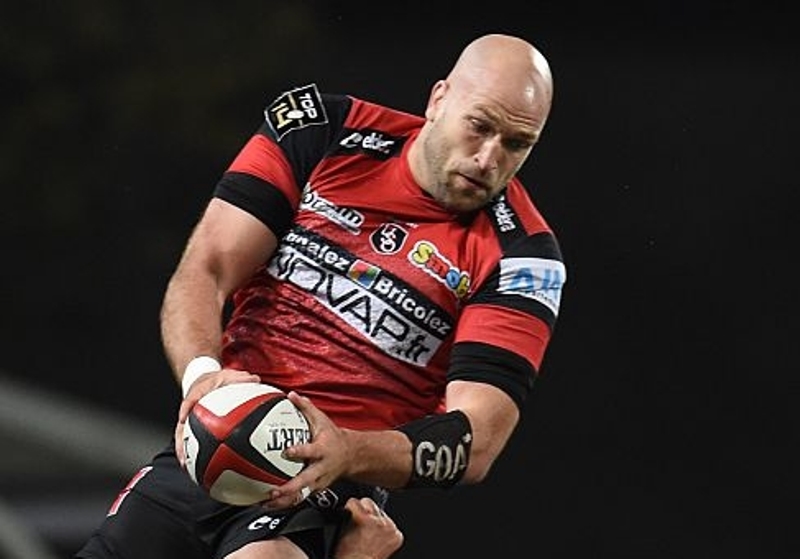
Robson’s madcap year in France playing Top 14 rugby for a small-town, chronically under-resourced, club could probably make a book in its own right.
It was a massive eye-opener – the club was in meltdown and were eventually relegated – and although he doesn’t regret a single second and made friends for life at the club and in the community, it also caused him to look at rugby afresh.
“Oyonnax was extraordinary. They were this incredibly gritty small club who were famously difficult to beat on their gluepot of a ground at the foot of the Alps which was always mudd or covered in snow or frost. They had regularly rolled over the big boys who just didn’t fancy it.
“So what did they do? They threw away their biggest advantage and broke the bank by installing a state of the art 4G pitch. And then they sacked half the loyal squad that had battled so hard against the odds to get them up into the Top 14 and keep them there. There was immediately a massive division – 50 per cent of the squad were old hands shaking their heads at the changes and 50 per cent were new arrivals like me.
“There were major man management problems as well. For some reason we were never told the team for Saturday afternoon until Friday night or sometimes even Saturday morning if it was a home match, so that drastically reduced the effectiveness of our training in midweek. And then coaches started to get sacked every three months or so. You would turn up on match day and they would be in a huddle fuming over the latest dismissal and not concentrating on the game.
“It was all a bit disconcerting and the rugby itself was absolutely brutal. It’s my considered opinion that very few English clubs could parachute into the Top 14 with much confidence of them flourishing.
“Of course the top English and British teams can compete with Top 14 sides in one-off European matches, not least because those games will not involve French officials, most of whom still let anything go. The notion of a gap in the lineout for example is totally alien and simply not refereed. You can go hoarse complaining but it makes no difference.
“The Top 14 just batters you. Every side, every week for 26 matches, has a massive pack and then most of them empty the bench in the second half with even bigger 135+kg units who are only physically capable of playing for 20 or 30 minutes. It’s unremitting, it’s not just two or three games in a Heineken Cup season spread over five or six months.
“And back to the refs again. The home crowds are so hostile and partisan that the fans still play a huge role in decision making. I thought I’d been around the rugby block but it was a real eye opener
“It’s a funny thing though. Before I left for France I had done my first year at Northumbria – I enjoyed it and worked diligently in my spare time without being totally wowed by the whole academic thing – and decided to defer the second year so I could give my full attention to moving abroad, living in the community at Oyonnax and learning French.
“But the season I spent there was such an exercise in observing mis- management and flawed leadership at the club that it totally ignited my practical interest in the degree. When I came back a year early I took to my studies with a vengeance, I had so much stuff I wanted to dig into.”
Getting into Oxford
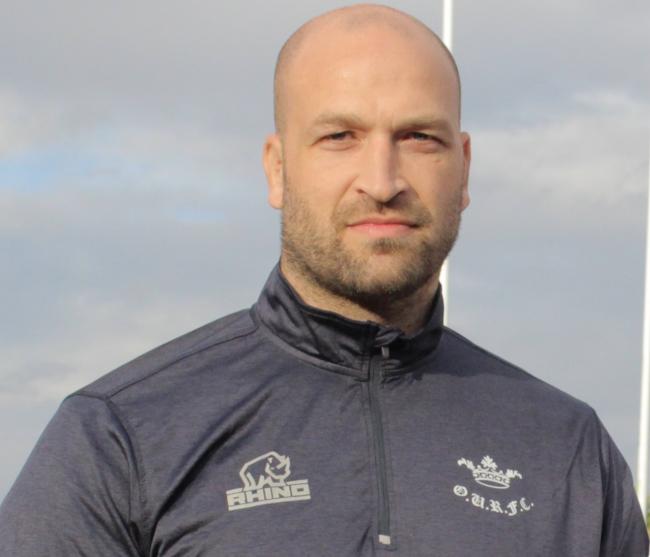
On returning to England Robson hitched up with London Irish where Brendan Venter was plotting their return to the Premiership and the club were rather attempting to rediscover themselves with that elusive brand of total commitment and professionalism on the pitch and good times off it that is their trademark.
Robson also, as he says, picked up his studies and started utilising his first hand experience by embarking on a dissertation examining ‘the management of power by directors of rugby in professional rugby’.
Having worked under Mark Evans, Dean Richards, Conor O’Shea and Brendan Venter he wasn’t exactly short on outstanding raw material and practical examples of good and, perhaps occasionally, not so good practice. For the curious, a copy of his pearls of wisdom can be viewed at the archives of Northumbria University library.
The dissertation played a big part in Robson being awarded a first-class honours degree and, much emboldened, Robson, at the end of the season, decided to conduct his own negotiatons for a contract renewal.
To cut a long story short the negotiations proved much more troublesome than he had envisaged and quickly developed into a watershed moment. There was already a promising job offer on the table from MusclePharm – did he, in fact, even want to continue as a professional rugby player?
He didn’t. It was time to get a proper job and while he kept his hand in as the lineout guru at Richmond on training nights and qualified as a grade three coach with the RFU – “I’m a rugby tragic I will always be involved in rugby somehow” – the dye was cast. He had played his last game in anger.
Except that he hadn’t, with the opportunity to at least apply for the MBA course changing everything. Robson takes up the story again.
“I looked at the course which almost felt tailor made for me, it ticked every conceivable box – but then there was the small matter of getting a place, it’s incredibly competitive and places are much coveted.
“I did the application forms and had to submit various essays, which I enjoyed doing, and finally got invited for the interview. Travelling up I decided on balance that it might not be a good idea if any of the panel were rugby fans – they might remember some of my less than honourable moments on the pitch. A quick google search will have revealed a couple of bans.
“As it happens the ‘panel’ was one person, a very scary Claude Littner type, or at least he was adopting that persona for the interview. What followed was one of the biggest shoeings of my career, but he must have sensed a spark of potential and ability because a few weeks later, amazingly, came the letter confirming my place.
“It makes for a full life but I’m loving it. Intensive studies at Oxford where I am based, rugby matches or training with the lads, some assignments in Europe with business.
“Most important of all are my wife Bantikia and youngster Axel. They have stayed at our house in Fulham while I spend the week in Oxford. Their support is everything and I couldn’t be living this dream without their indulgence.”
BRENDAN GALLAGHER


